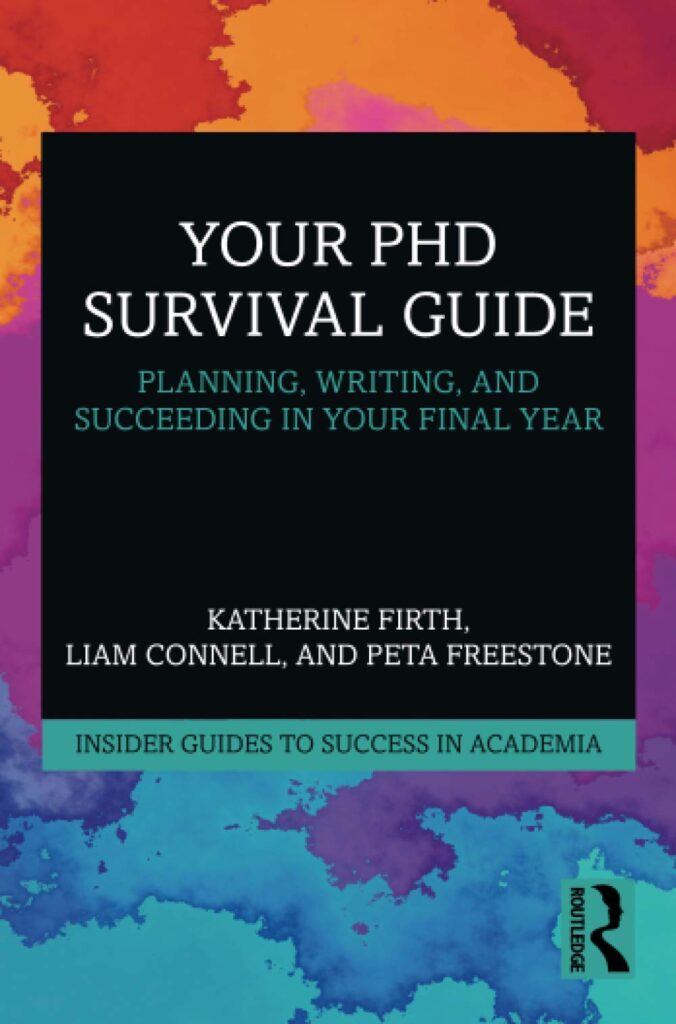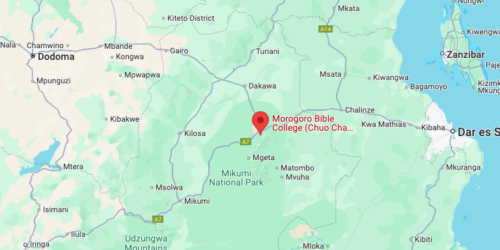Review: Your PhD Survival Guide

Your PhD Survival Guide
Abingdon: Routledge, 2021
ISBN 978 0 367 36184 6
£18.99 paperback; £17.09 Kindle version
I’ve greatly appreciated this practical and thoughtful book, and have already made use of a number of its key ideas in leading a session on the ‘final year’ (quotation marks since for part-time PhD students, it’s frequently more than 12 months)—see my slides here. This review will sketch its key features and themes, and highlight how it can be helpful to both students and supervisors in the final stretch towards submission and the viva/oral defence.
The authors are a trio of people who work in research training and support in Australian universities (I wish we had many more such people in the UK), and are vastly experienced in helping doctoral students get finished. Peta Freestone is the inventor of Thesis Boot Camp, and collaborates with Liam Connell in this project—it’s an approach which has helped lots of doctoral students to get writing. Katherine Firth blogs very helpfully on research degree work at Research Degree Insiders. These are people worth listening to!
The book aims at a wide audience of subjects/disciplines with universities and colleges. I found it very helpful in my area of Theology, a subject usually seen as somewhere in Arts and Humanities. It is organised into four parts: Focusing on the project, focusing on the person, focusing on the text, and finishing the PhD.
Focusing on the project has chapters on:
- defining the scope and argument of the project (ch. 1)—getting clear what you’re asking and what your answer is;
- getting through the crunch of finishing up (ch. 2)—some good strategies here for keeping the project moving forward;
- practical project management (ch. 3)—a very practical series of approaches to planning, organising your time (I like the idea of a ‘time budget’ here), and tracking progress;
- working with your strengths and weaknesses (ch. 4)—some good discussion of being self-aware of the kind of researcher you are, with a very sensible and do-able approach to keeping a research journal, and the encouragement that you can survive your PhD.
Focusing on the person has chapters on:
- addressing unhelpful myths (ch. 5)—about stress, about working more hours meaning more productivity (it doesn’t!), about not taking holidays (bad idea!), about self-care being for wimps (with good practical advice on your desk set-up, exercise, food, sleep and mental health), and about the (non-)motivating effect of deadlines;
- ‘your harshest critic’ (ch. 6)—the dangers of being wrongly self-critical, imposter syndrome, perfectionism and procrastination, and the wonderfully-named JOMA syndrome (just one more article and then I can write), mistaking your PhD thesis for a coursework essay (and setting the bar too low) or for your magnum opus (and setting the bar too high), and mistaken failure-avoidance strategies;
- getting beyond being ‘stuck’ (ch. 7)—some practical strategies for doing that;
- working with your supervisor (ch. 8)—knowing what you should expect from your supervisor and what you are expected to do, communicating professionally and assertively with your supervisor, and dealing with challenging supervisors (the absent one, the micromanager, the perfectionist, the friend-colleague, the rock star, the bully).
Focusing on the text has chapters on:
- getting writing done (ch. 9)—they introduce and unpack a helpful ‘writing cycle’ (thinking, writing, editing, polishing), the perfect sentence vortex (very helpful for avoiding perfectionism), writing what they politely call the ‘zero draft’ (less politely, the shitty first draft), working out what you think by writing, using generative writing to move your thinking on, and giving yourself the best chance of being in the ‘writing zone’, including ‘shut up and write’ groups;
- putting the thesis together as one coherent work (ch. 10)—they helpfully distinguish structural editing (getting the whole into shape) from stylistic editing (line-by-line revision, ensuring you are using the conventions of your discipline consistently, etc.), and then unpack both types of editing: the ‘tiny texts’ and ‘reverse outline’ strategies are wonderfully helpful—I’ve used them myself, and so have some of my doctoral students—and so is the very clear part on signposting;
- making the words good (ch. 11)—helpful material on writing with an expert’s voice, the style and reader expectations of scholarly work in your field, more on stylistic editing, the use of appropriate vocabulary and jargon (which they rightly say isn’t a bad thing—good jargon can save writing a long phrase).
Finishing the PhD is the shortest part, and includes chapters on:
- reflecting on being a researcher (ch. 12)—knowing about yourself as a thinker and scholar, as well as a whole person.
- whether you really want to finish the PhD (ch. 13, perhaps appropriately numbered!)—addressing the important question of deciding not to finish, and why and how a student might do that.
- the relief and grief of finishing a PhD (ch. 14)—the up- and down-sides of finishing a PhD, and what comes next.
Each chapter has good references to books, articles and websites, which are bang up to date. There’s also a useful index of topics, making it easy to find a key discussion if it’s not obvious from the chapter titles.
This is a fine book which deserves a wide circulation among students and supervisors. Much of it is relevant earlier in the PhD process as well as in the endgame, notably the ‘Focusing on the project’ and ‘Focusing on the person’ sections, plus ch. 9 on getting writing done. I’ve learned new things from the authors, been confirmed in some of the things I do as a supervisor, and been corrected in some of the errors I’ve made in supervising (and as a PhD student myself many moons ago). The authors have made a valuable contribution to our thinking—thank you!



